|
|
|
Sort Order |
|
|
|
Items / Page
|
|
|
|
|
|
|
| Srl | Item |
| 1 |
ID:
128054
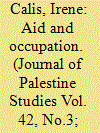

|
|
|
|
|
| Publication |
2013.
|
| Summary/Abstract |
This article foregrounds how international aid and the Israeli occupation intersect in the historically prosperous West Bank agricultural village of Jayyus; with most of its lands isolated behind the Israeli Wall, Jayyus is now aid-dependent. While material aid plays a larger role in sustaining the village, it is through "advocacy work" (a form of international aid largely unaddressed in the literature) that Jayyusis experience aid on a daily basis. The article examines the paradoxes of dependence and subordination seen from the vantage point of local communities under the jurisdiction of an occupying power and in the absence of a sovereign Palestinian state. Also shown is how the routinization of aid both obscures the ongoing status of occupation and has become an important mechanism that sustains it.
|
|
|
|
|
|
|
|
|
|
|
|
|
|
|
|
| 2 |
ID:
169451
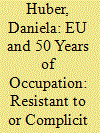

|
|
|
|
|
| Summary/Abstract |
This article focuses on the role the EU has played in the normalization of the 50-year long Israeli occupation of the Palestinian Territory. Has it resisted the occupation, challenging its normalization, or has it been complicit in it, thus contributing to it? To answer this question, the article proceeds in two steps. Firstly, it describes the ‘occupation’ through an inductive approach that reconstructs its structure through how it is experienced and described by key Israeli, Palestinian, and European human rights organizations active in the field, namely as a continuously expanding legal and territorial structure of domination. Secondly, it then juxtaposes the occupation so conceptualized with EU discursive and policy practices on the multilateral, bilateral, and unilateral levels. It reveals that, besides the widely noted discourse–practice gap related to the territorial structure of control, there is also a practice–discourse gap related to the legal structure of control, but which is silenced in EU discourse although partially addressed in its practice. The EU has been both complicit in and resistant to the occupation and therefore its role in the normalization of the occupation has been ambiguous.
|
|
|
|
|
|
|
|
|
|
|
|
|
|
|
|
| 3 |
ID:
154290
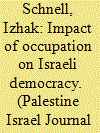

|
|
|
|
|
| Summary/Abstract |
The Israeli occupation has eroded Israeli democracy through a narrow neo-Zionist patriotism, a culture of disregard for the law and a divided national identity.
|
|
|
|
|
|
|
|
|
|
|
|
|
|
|
|
| 4 |
ID:
174259
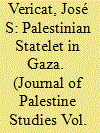

|
|
|
|
|
| Summary/Abstract |
Fatah leaders routinely accuse Hamas of plotting to establish an “emirate” in the Gaza Strip. Gaza is in fact turning into a statelet separate from the West Bank, but it is Israeli policies that are driving the “Gaza is Palestine” option with a series of measures that have been implemented since the early 1990s to sever Gaza from the West Bank. This development has intensified under the administration of U.S. president Donald Trump. In the White House's vision for Middle East peace, which turns the West Bank into a series of isolated Bantustans enveloped by Israeli territory and shorn of Jerusalem, the Gaza Strip becomes the centerpiece of any future Palestinian entity. The international community, laser focused on avoiding another war in Gaza, has prioritized the humanitarian over the political crisis, furthering the excision of the Palestinian territory. As aid flows directly into Gaza, bypassing Ramallah, and Israel and Hamas negotiate a long-term ceasefire, the Palestinian Authority (PA) finds itself increasingly marginalized.
|
|
|
|
|
|
|
|
|
|
|
|
|
|
|
|
| 5 |
ID:
144593
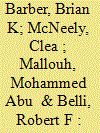

|
|
|
|
|
| Summary/Abstract |
This article summarizes a uniquely thorough study of the first generation of Palestinians to have lived the whole of their lives under occupation. Findings from group interviews and large, representative surveys of men and women from the West Bank, East Jerusalem, and the Gaza Strip in 2011 draw a complex portrait of day-to-day life both currently and historically, including: widespread political activism that they continue to prize; high levels of exposure to often demeaning political violence and restriction of movement; limited access to basic resources, low employment stability and poverty; high levels of social cohesion, but also of lack of safety, political instability, fear for the future, stress, and feeling broken. Most were not optimistic in 2011 about the peace process but remained, confident in their ability to manage what the future brings. The findings also show that each of the three territories has unique types and levels of challenges.
|
|
|
|
|
|
|
|
|
|
|
|
|
|
|
|
| 6 |
ID:
145801
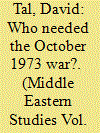

|
|
|
|
|
| Summary/Abstract |
Scholars and pundits believe that Anwar Sadat went to war in October 1973 because Israel left him no choice. The Israeli government rejected his peace proposals during 1971–73, and Sadat initiated the war in order to demonstrate his refusal to agree to the status quo and to the continuation of the Israeli occupation of the territories it occupied in June 1967. However, when the peace treaty signed between Israel and Egypt in March 1979 is carefully studied, it appears the terms of the treaty were in fact much closer to the Israeli position and terms as presented before the 1973 war than to those set by Sadat. Careful reading of the relevant documents in general and Sadat's claims and arguments in particular will show that it was actually Sadat who needed the war, and he needed it not in order to force Israel into a political process, but for himself, so as to accept terms he could not accept without a war.
|
|
|
|
|
|
|
|
|
|
|
|
|
|
|
|
|
|
|
|
|